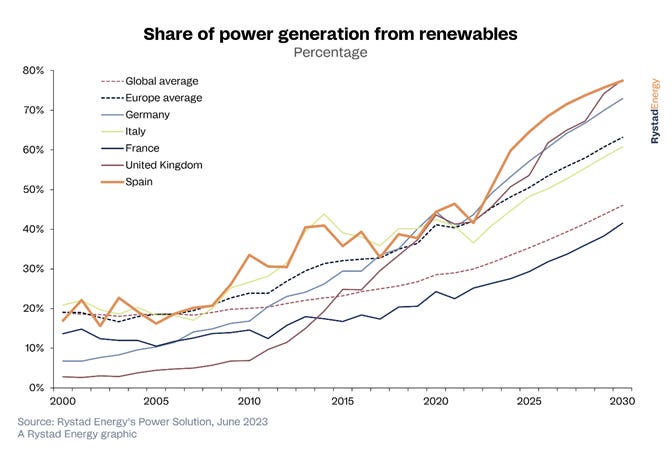👯 This Week in Spain: Coupling up for 23J
Also: Crazy kidnapping, absent Germans and Almeida's new lady.
By @IanMount and @AdrianBono | June 8, 2023 | Madrid | Issue #17
🎉 Welcome to The Tapa, an English-language, weekly newsletter about all things Spain!
🥜 This Week in a Nutshell: Just as we expected, this week has been insane. From a debate about debates to running against the clock to form political alliances, politicians in this country are so busy discussing the upcoming elections that one wonders when they’ll have time to govern.
🙏 Remember that if this email gets truncated at the bottom because it’s too long, just click here to read the rest on Substack.
🕺If you haven’t subscribed yet, please do so by clicking on the button below.
🫶 And if you already have, please send this newsletter around to your friends and family and help us keep growing.
Somebody’s gonna be left out
🧑🏼❤️🧑🏻 Time to Find a (Political) Dance Partner Before the Music Stops
First, let us start with an apology. As in we’re gonna talk about politics again, and we’re sorry about that. But there’s really no other option. At least we’ll keep it short. Pinky promise!
The clock is running out on the far-left—and therefore on socialist Prime Minister Pedro Sánchez’s chances. Coalitions have 10 days from the calling of elections to file their paperwork with the electoral commission—that is, until Friday, June 9 (at midnight, it seems). Smart analysts, like Teneo’s Antonio Barroso, note that for Sánchez’s PSOE to have even a chance to build a left-leaning majority, the “only scenario” is one where the two parties to his left—Sumar and Unidas Podemos—run together as a coalition.
With a deadline focusing the mind, this should be easy, right? The short answer is “Wrong!” Just listen to their words: “We are not going to wait until the last minute. We are finalizing the agreement." That’s Sumar's new spokesman, Ernest Urtasun, on a visit to the Doñana wetlands with Yolanda Díaz, the party’s boss (and current Second Deputy Prime Minister). Which sounds to us like, “It will happen at the last minute, if at all.” Because politics is opposite day. But maybe we’re cynical.
So why is forming a coalition so hard? Basically, the two parties don’t trust or like one another. At all. To boil it down, Sánchez prefers Sumar because 1) Yolanda Díaz polls better than any Podemos leader 2) Podemos collapsed in the 28M elections and 3) Podemos was behind the disastrous Solo Sí es Sí law (whose author, Irene Montero, polls worst of all). So Sumar—which was just friggin’ born—is telling Podemos that it will have to be the junior partner, and a lot of its toxic ministers (like Montero) will have to stay out of sight. And Podemos doesn’t like that one bit.
Proof #1: Former Podemos boss and Montero’s partner Pablo Iglesias slammed Sumar for looking for “revenge” and vetoing unpopular Podemos pols like Montero, current leader Ione Belarra and parliamentary spokesman Pablo Echenique. Podemos was already being "very generous", he said, in accepting that "it is no longer the hegemonic party in [the far left] despite being the party that has the most electoral support." In other words: Don’t mess with me.
Proof #2: Madrid assemblyman Félix López-Rey of Más Madrid (which will form part of Sumar) tweeted, “Imposing Irene Montero and Ione Belarra, the least popular Ministers of the government, is a mistake by Pablo Iglesias that endangers the construction of a progressive alternative.” In other words: Get them out.
Which leads us to…The Debate About Debates.
PM Sánchez is in desperate straits with his erstwhile allies (and only lifeline) squabbling with one other, so he did what desperate pols do—he called for TONS of debates. Speaking in Madrid on Monday, Sánchez offered up to six face-to-face debates with PP candidate Alberto Núñez Feijóo—that is, one debate per week until the elections on July 23. The Prime Minister also said beyond these six, he was up for a few other four-way debates, to include Sumar and far-right Vox. You don’t have anything on, do you?
Now, Feijóo isn’t so crazy about all of this and will want to avoid debating Sánchez—Feijóo is leading, and he’s less comfortable debating on live TV. PP spokesman Borja Semper: “Spain doesn't need six debates; it is Sánchez who needs them.”
Sumar boss Díaz also joined the conversation to complain about the idea of a series of one-on-one debates: “Anyone who believes that the future of Spain can be summed up in a photo of Pedro Sánchez and Feijóo is out of touch with the reality of our country,” she tweeted. “The two-party system is the past."
No presidential debates have been held in Spain since 2015 (when then-Prime Minister Mariano Rajoy debated hopeful Pedro Sánchez).
Before we leave, what do the polls say?
Most polls are saying that the PP has a clear lead over PSOE and will very probably reach an absolute majority by forming a coalition with hard-right Vox, but differ on the chances that the left has to remain in power after July 23.
According to the average of polls from Spain’s state-owned RTVE, the PP would be the most voted party with 31% of the votes and 134 seats. This represents an increase of 55 seats and 10 percentage points compared to the 2019 elections. With the 45 seats Vox is expected to get (it currently holds 52), the two parties would reach a total of 179 seats (176 are needed to reach a majority).
The PSOE would get 25% of the votes and 98 seats, three percentage points and 22 seats less than they currently hold. If they run as they are now (i.e. separate), Sumar would receive 11.9% (28 seats) and Podemos 3.1% (seven seats).
🔔 A Message From Our Sponsor
Secret Kingdoms is your English bookstore in Madrid. It specializes in Spanish history and literature, contemporary and classic novels, books for children and young adults of all ages, history and historical fiction, thrillers, science fiction, fantasy, poetry, biographies and much more.
Located on Calle de Moratín 7 — a few blocks away from the Prado Museum — and with over 20,000 new and used books, Secret Kingdoms has something for everyone.
Coming up in our reading series:
An Evening with Marjorie Kanter — June 10, 7:45 p.m.
Lane Greene — Writing With Style — June 16, 7:45 p.m.
Find out more at www.thesecretkingdoms.com
💬 Five things to discuss at dinner parties this week:
🕵🏻♂️ 1. That kidnapping mystery in Andalucía
This story is so crazy that a Netflix special may be in the works soon. Before you watch the video above (seriously, wait) let’s start with the facts.
It all began in Maracena (pop. 22,000), a town right outside of Granada, in Andalucía. On the morning of Feb. 21, a 44-year old named Pedro Gómez kidnapped Vanessa Romero, 46, a PSOE councilwoman from the same town.
Gómez asked Romero to give him a ride in her car—they sorta knew each other—when they saw each other outside her kids' school. Fine. But then…when she did, he pulled out a fake gun, tied her up and put her in the trunk. He then drove to Armilla, another small town on the Granada outskirts, and parked her car near a warehouse he’d recently rented.
Next? A Walmart break: Gómez took a train to Maracena to buy a butcher’s knife and duct tape while Romero was still trapped in the trunk. Problem with that? She managed to escape by kicking down the backseats and asking for help.
The End.
Just kidding. This is actually the beginning because as it turns out…(wait for it)…the kidnapper was the boyfriend of Maracena socialist mayor Berta Linares.
Fine. I am not my boyfriend’s keeper and all that. The police had approached the mayor on the day of the crime and described the situation to her. She worked with the authorities to try and find Gómez (they went to her home but the house was empty). Eventually, Gómez was arrested by the Maracena train tracks.
Linares offered a tearful press conference the next day (now see the video above) to say that Gómez had been undergoing psychiatric treatment for depression, but no one really knew what drove him to do it. Linares said he may have overheard her on the phone discussing town hall matters that involved Romero, and that’s what drove him to attack her. Gómez for his part stayed silent.
But a twist a few days before the 28M elections caused a big ol’ political earthquake. You see, secrecy in the case was lifted and we all found out that the judge handling the case had asked the regional High Court to investigate the mayor for maybe, you know, masterminding the kidnapping, along with the city’s ex-mayor, Noel López, who is currently the Secretary of Organization for the PSOE in Andalucía.
According to court docs, Gómez’s said the politicians had a meeting where they pushed him to commit the kidnapping (and yes, he had been diagnosed with bipolar disorder).
Gómez also said mayor/girlfriend Linares met with him on the morning of the kidnapping—contrary to what she told the press. In fact, the Guardia Civil provided footage from a nearby security camera that morning, corroborating the meeting, in which she allegedly informed him that Romero had managed to escape and that the police were looking for him.
Not only that, but turns out the judge was also eyeing another investigation, this time into local urban planning based on documents found in the kidnapped councilwoman's car.
The documents deal with up to five ongoing legal proceedings between the City Council and various companies, according to El País, as well as other public works projects in which dodgy payments or bidding played a role.
Romero said this is why she was kidnapped—as she had confronted Linares with the documents on several occasions.
Linares denies the accusations and says she is the victim of a “media lynching”. López, in the meantime, has stepped down from his position in the PSOE until the investigation is over.
Linares insists that she’s offered “total collaboration” to the authorities and that she hopes the situation is clarified quickly. But we feel this is just getting started.
2.🍓The Germans are (not) coming!
Andalucía’s decision to legalize some 1,000 illegal wells near one of Europe’s most important wetlands zones—the Doñana National Park—was super controversial. So much so that a German consumer group collected over 160,000 signatures calling for a boycott of the strawberries grown by the farmers in the zone. And that’s a big deal, because Germany imports 30% of the strawberries grown in the area.
And so, a delegation of German parliamentarians decided to visit Doñana to better understand the situation. They were meant to meet with representatives of the Spanish government (led by the PSOE), the Andalucian government (led by the PP), as well as scientists, ecologists, and the like.
But that is not going to happen—because of the 23J elections. The German delegation made its way to Madrid on Monday and met for two hours with Spain’s secretary of state for the environment, Hugo Morán. But then the delegation left the meeting and, without comment, boarded a Mercedes Benz minibus (very German of them) and departed.
The Germans justified their sudden departure by noting that they did not want to interfere in the elections. “In view of the high political importance that the topics of the trip have gained in the past few days in the upcoming Spanish national elections, the German Bundestag Committee for the Environment” has decided to hold off for now, they said.
Holy election hand grenade! The sudden departure shockingly (not!) inspired different interpretations from the PSOE and the PP.
Not long before the Germans’ decision, the governing PSOE’s environmental minister Teresa Ribera said that the PP has "marred" the reputation of the Doñana, which generated a "reputational risk" for farmers who grow berries there.
The PP responded by…thanking the Germans for leaving. Andalucia’s own environment minister Ramón Fernández Pacheco said that the German deputies showed "more institutional loyalty and common sense" than the Spanish government. Ouch!
Then the PP went on (as parties do in election periods). Fernández Pacheco said the Sánchez government was using the Doñana issue for electoral ends and that had “backfired” on them. (Actually, he said, “Le ha salido el tiro por la culata", which is basically they shot themselves in the butt. Or out of the butt. Which is sorta funny.)
Lost in this sea of hilarity is any real effort to solve Doñana's very real problems with a shrinking water supply—which will make a gem of a wetlands disappear. Not to sound too childish but, priorities people!
3. 🧑🌾 Fightin’ farmers
Hundreds of angry farmers had a massive fight with the police as they tried to invade the Delegación Territorial de la Junta building in Salamanca. Eleven cops and one farmer were injured, and one farmer was arrested. If you saw this on TV, your reaction was probably much like ours: Wait, farmers brawling with the cops?
So, why so fighty, farmer? The short answer is bovine tuberculosis, a kind of TB that has been found in Castilla y León and causes cattle to lose weight and give less milk—and can be passed to humans. The region’s agriculture department—in the hands of Vox since a February 2022 election led to a PP/Vox coalition there—relaxed the rules for oversight and prevention of bovine TB on May 15. The region’s Vox No. 2 thought they were “arbitrary.”
The relaxed regulations did not sit well with the PSOE-led government in Madrid, or the EU (the WHO aims to wipe out TB, which killed 1.6m people in 2021, by 2030). The central gov asked a judge to suspend the new rules (the regional government, in PP hands didn’t put up a fight, and the court agreed) and Spain’s agriculture ministry put out an order on May 29 that confines all cattle in the parts of Castilla y León where there have been outbreaks (six of the nine provinces), prohibiting them from being moved to another region or out of the country. In the words of the Colegio de Veterinarios de Salamanca, “even the most ignorant person knew that [the new rules] couldn’t go into force.”
With the shift from promised rule easing to a serious lockdown, farmers got aaaaangry 😡. If you can’t move your cattle, you can’t sell them, for one thing. And many farmers think the EU rules were unreasonably strict and expensive to follow (infected cows have to be killed) and that the tests for bovine TB turn up false positives. Now, the farmers were suffering whiplash. "They have used the issue to win votes, they promised to relax the controls, but nothing has been achieved," one farmer told El País.
What’s next? A large farmer and rancher union has announced that starting June 12 it will boycott the health checks for bovine TB unless the rules are relaxed. This one is not done yet.
4. 🌞 Blowing in the wind

Spain is on track to generate more than 50% of its power from renewables this year, making it the first of Europe’s Big 5 power users to do that. Rystad Energy reported Tuesday that Spain—one of the long-time leaders in the European renewables sector—will beat France, Germany, Italy and the U.K. to that record. 👏👏👏
Rystad: “The country was an early adopter of onshore wind, technology that now accounts for more than 20% of Spain’s power generation. Significant solar PV investments have also ramped up capacity and related generation in recent years. Hydropower, which used to be Spain's largest source of renewable energy, accounts for approximately 10% of its total generation today.
But further growth in renewables’ share could slow because of…France? Spain’s neighbor to the north has “struggled with low nuclear power generation this year”, forcing it to turn to Spain for imports. And Spain’s power prices are cheaper—34% cheaper this year, Rystad says—which makes imports even more attractive.
Why so cheap? Well, in part, because of the “Iberian Exception”. That refers to the ability of Spaniards to exist on an average of 3 hours of sleep a night, a skill that leaves foreigners feeling “forever jet-lagged”. Oh, wait, untrue. What it really refers to is the deal Spain crafted with the EU last June (2022) that allowed Madrid to cap gas prices in the power sector because it didn’t use much Russian gas, had plenty of renewables, and wasn’t very connected to the rest of Europe.
So with cheap gas Spain makes cheap electricity, which it can sell to France, and… Hmmm, that doesn’t seem like the original intention of the Iberian Exception.
5.🛑 Stop everything! Madrid’s Mayor has a girlfriend
Madrid Mayor José Luis Martínez Almeida is on a roll. Not only he recently managed to obtain an absolute majority in the city’s municipal elections (which will allow him to govern without the need of far-right Vox), but now apparently he is also dating someone.
Now, bear with us for a sec. We know. This isn’t Hello! magazine and you’re probably wondering why we’ve chosen to include this seemingly irrelevant story. Well, this section is called “things to discuss at dinner parties” and you can bet this will come up when you’re sharing a glass of Rioja this Friday with your Spanish peers.
Almeida has long been the PP’s “golden bachelor”. At 48, he’s never been married (not that there’s anything wrong with that) and many articles and social media posts have been written about why he’s perpetually single. In interviews, he has confessed to being somewhat of a “mess” in his personal life, “having an empty fridge and always eating canned food”, and in the past has even said he has “abandoned all hope of finding a partner” because he is “a disaster”.
He has, on many occasions, made fun of himself, such as when he said on hit TV show El Hormiguero that he thought people would be “surprised” he couldn’t find a date, “considering his physical appearance”.
He was even asked to participate in an episode of Cuatro’s matchmaking show First Dates, but allegedly refused.
Let’s face it. Dating is already hard enough in 2023 (ask Gen Z if you don’t believe us). But dating while being mayor of the capital of one of the largest economies in the world? You try coming up with a Tinder profile that doesn’t sound like you’re humblebragging. This, however, all appears to be in the past now, since as of last weekend Madrid’s golden boy is officially off the market.
Last Sunday afternoon, he showed up to the "corrida de toros" (bullfight) held in Las Ventas with his new girlfriend Teresa Urquijo y Moreno, a 26-year-old real estate analyst. And this wasn’t just any event. It was the celebration that concludes the Feria de San Isidro (which we covered here a month ago, remember?), and was presided by the King, which is the political equivalent of meeting the parents.
On second thought, maybe not. According to local media outlets, her grandmother is cousins with King Emeritus Juan Carlos (her last name is literally Borbón) so we’re pretty sure she and the King already knew each other.
The two have apparently been dating for around six months now (so sayeth “media reports”) but this was the first time they were seen in public. It’s the first known relationship of Martínez-Almeida since he became mayor of Madrid in 2019.
🙏 Before you go, please remember to share this newsletter with your friends on social media. The more we grow, the more information we’ll be able to offer each week.
We’ll be back next week with more.







